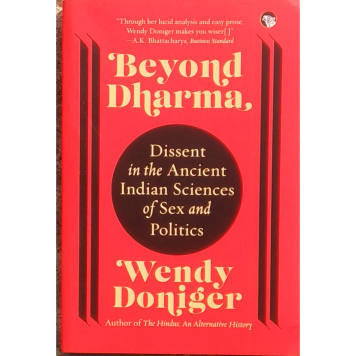
Title: Beyond Dharma – Dissent in the Ancient Sciences of Sex and Politics
Author: Wendy Doniger
Publisher: Speaking Tiger Books, 2020
When one of the world’s most acclaimed and charming scholars of Hinduism presents a trailblazing interpretation of ancient Indian texts and their historic influence on subversive resistance, the book ought to be of more than ordinary interest.
Eminent Indologist Wendy Doniger’s book was published by Yale University Press earlier under a slightly different title. It has now been republished in India by Speaking Tiger Books, thus widening the scope of readership.
Their blurb on the book reads: “Ancient Hindu texts speak of the three aims of human life: Dharma, Artha and Kama. Translated, these might be called religion, politics and pleasure, and each is held to be an essential requirement of a full and fulfilling life. Balance among the three is a goal not always met, however, and dharma has historically taken precedence over the other two qualities, or goals, in Hindu life.”
Doniger is the author of several acclaimed and bestselling works, among them, The Ring of Truth: Myths of Sex and Jewelry; Hindu Myths; On Hinduism; Siva, the Erotic Ascetic; Dreams, Illusion and Other Realities and Reading the Kamasutra. She is the Mircea Eliade Distinguished Service Professor of the History of Religions at the University of Chicago and has also taught at the School of Oriental and African Studies, University of London, and the University of California, Berkeley. Then, she has also been a controversial historian. Her earlier book The Hindus: An Alternative History was banned in 2009 because of some disruptive exemplifications of Hindu gods.
In the present book, she offers a spirited and close reading of two ancient Indian writings—Kautilya’s Arthashastra and Vatsyayana’s Kama Sutra. She argues that scientific disciplines have offered animated and continuous criticism of dharma over many centuries. While she chronicles the tradition of veiled subversion, she uncovers connections — to voices of dissent all the way through Indian history.
The book offers deeper insights into the Indian theocracy’s subversion of science by a limited version of religion these days. In the preface she contends: “Prime Minister Narendra Modi’s attempts to replace genuine science with ludicrous religious science debases not only the work of real scientists working in India today but a strong ancient tradition of scientific opposition to religious dogma, a tradition that we can see at work in the two great texts.”
The Hindu belief system has always encouraged deliberations, debates and questioning of not only one’s beliefs but also, of all the ancient Indian texts — whether they are religious or impious. Consequently, Doniger’s book offers to the readers an occasion to deliberate on Indian texts in the modern day context.
The book with its exemplary research is insightful and also somewhat controversial as it attempts to define the elusive word dharma and its overall place in human life. It is not just about the philosophical aspect of dharma, rather it draws parallel between Kautilya’s Arthashastra and Vatsyayana’s Kama Sutra and how both oppose what is mentioned in the Dharmashastras.
The book picks up popular terminologies from Hinduism, such as moksha (freedom from the cycle of birth) and provides different views of the word when mentioned in Arthashastra and Kama Sutra.
While talking about Hinduism and dharma, it is impossible to not talk about Manu. Doniger argues, “There are many other dharma texts, with significantly different ideas on many of the subjects that concern us here; some are older, some later than Manu… But Manu’s text remains the gold standard that later texts either accepted or rebelled against, and it provides a base against which we may measure the other two texts that are our main concern.”
Doniger makes some interesting observations that exists in the two ancient texts. For instance, in the section ‘Spying and Seducing’, the author brings out exhilarating facts. “The paranoid psychology of the political text casts its shadow over the erotic text. Eternal vigilance is the price of tyranny — but also the price of adultery.”
Divided into eight chapters, the book pronounces, “As not only Protestants but Victorian Protestants, the British rejected as filthy paganism the sensuous strain of Hinduism, both the world of kama and much of Hindu theological dharma, with what they saw as kitschy images of gods with far too many arms. It reminded them of Catholicism.”
In the epilogue, Doniger brings forth the colonial impact on these texts. She says, after the British colonized India in the eighteenth century only a sanitized version of the Kamashastra arrived.
As a whole, Doniger’s book must be read with panache. Even though it is a well–researched book with a liberal outlook, her point of view would surely give rise to opposing discourses.
Bhaskar Parichha is a journalist and author of No Strings Attached: Writings on Odisha and Biju Patnaik – A Political Biography. He lives in Bhubaneswar and writes bilingually. Besides writing for newspapers, he also reviews books on various media platforms.
Originally published in Borderless Journal
GET COUNTERCURRENTS DAILY NEWSLETTER STRAIGHT TO YOUR INBOX














































